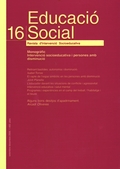Abstract
The kidnapping of the symbolic space in the disabled is a reflection on the situation in which subjects who have been classified as disabled find themselves in society. The artic1e reviews the theoretical modests which have like wise reviewed the "scientific" conditions that determine who is or is not disabled. Proposals for the frame work of intervention of professionals are put forward, alld which are framed within the theory of the evaluation of Social Roles. The article ends with a dissection of the social view of the sexuality of handicapped people.References
Barnes, C. ( 1990) Cabbage Syndrollle: The Social construction of Dependence. Lewes. Falmer.
Fougeyrollas, P. i al : ( 1999) "Conséquences sociales des déficiences et incapacités persistantes et significatives: approche conceptuelle et évaluation des situations de handicap", dins HANDICAP. Revue des sciences humaines et sociales. nº 84, pp. 6 1-78.
Gomez, J-F. ( 1999) Le temps de rites. Desclée de Brollwer, París.
ICIDH-2 ( 1997) International Classiflcation of impairments. Disabilities and handicaps. OMS. Ginebra.
Lavigne, Ch. ( 1996) "Entre nature et culture: La représentation de la sexualité des personnes handicapées mentales" dins Handicaps et Inadaptations, nº 72, 58-70
Morris, J. (1991) Pride Against Prejudice. Women's Press. Londres .
Ober, M. (1996) "Blanche-Neige et les sep nains" dins Ober, M. i al. (Eds) Etre adulte quand on est handicapé mental. Castries, Gerse.
Van Gennep. A. (1981) Les Rites de passage. Picard , Paris.
Vocal, Y. (1997) Apri voiser la déficience mentale. L' Harmallan. París.
Wolfensberger, W. ( 1991) La valorisation des rols socials. Éditions des deux continents. Gi-nebra.
Rights
Copyright
Educació social. Revista d'intervenció socioeducativa es publica en accés obert sota la llicència Creative commons reconeixement-nocomercial (by-nc): es permet l’ús del seu contingut sempre que se citi l’autor o l’autora i la publicació, amb la seva adreça electrònica exacta. Es permet la generació d’obres derivades sempre que no se’n faci un ús comercial. Tampoc no es pot utilitzar l’obra original amb finalitats comercials.
El copyright © de la revista pertany a la Facultat d'Educació Social i Treball Social Pere Tarrés. Universitat Ramon Llull



